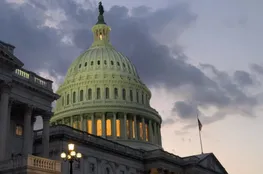Opinion: Congress shouldn’t make it harder to care for our kids When students line up for lunch at Bethlehem’s middle schools, they see familiar faces. We’re the ones serving their meals, asking how their day is going, making sure no one is left behind. We’re not just lunch ladies. We’re moms, grandmother’s, neighbors — and like millions of other essential workers across this country, we also rely on Medicaid to keep our families healthy. In April all but two Republicans in the House of Representatives voted for a budget plan that passed 216 to 214. The plan tells the Energy and Commerce Committee, which has jurisdiction over Medicaid, to slash spending by $715 billion over the next decade to help pay for a large tax cut. If they succeed in pushing through those cuts, it won’t just be numbers on a spreadsheet. It will be people like us — and the kids we care for every day — who will pay the price by losing access to Medicaid. One of us is the mother of an adult son with a cognitive disability who’s depended on Medicaid since he was 4. The other is helping raise a grandson who’s battled chronic health issues and whose care would be impossible to afford without Medicaid. This program doesn’t just keep our families afloat — it’s what allows us to keep working. Cutting Medicaid would rip that safety net away from millions of working families across the country, including right here in Bethlehem. To support those same tax cuts Republicans are proposing slashing the Supplemental Nutrition Assistance Program — which helps put food on the tables of 42 million Americans , 17% of whom are children including some of the same students we serve. What happens when parents can’t afford care, when kids come to school hungry, and when families are forced to choose between health and housing? We’ll tell you what will happen: access to health care will diminish, students will go hungry, and communities will fall apart. We serve over 1,000 students a day, and we know them by name. They see us in the cafeteria and run to hug us at the grocery store. We treat every student as if the hot meal we hand them is the only one they’ll get that day, because sometimes, it is. This isn’t theoretical. It’s personal.
It’s not just unjust. It’s immoral. If these cuts go through, Pennsylvania is expected to be one of the hardest hit. The impact begins at birth — Medicaid covers about one-third of all births in the state — and it only grows from there. Children could lose access to routine checkups, vaccinations and early screenings that help catch developmental issues before they become crises. Families who already live on the edge would be pushed even closer to it, forced to choose between medical care and keeping the lights on. As kids grow, the strain doesn’t let up. School nurses, counselors and mental health supports — many of which rely on Medicaid funding — could be scaled back or eliminated altogether. That would leave teachers and school staff with fewer tools to support students, and leave children without access to care they might not get anywhere else. Working parents who rely on Medicaid to afford their prescriptions, manage chronic conditions or get therapy for their kids could find themselves with nowhere to turn. For people with disabilities and aging adults, the stakes are just as high. Nursing homes, already stretched thin, may not survive the loss of funding. People with disabilities, like one of our sons, could lose access to the basic community support that gives them a sense of dignity and independence. Rural hospitals — often the only option for entire regions — might close their doors, leaving entire communities without emergency care. In our two congressional districts alone, roughly 380,000 people rely on Medicaid. These are our neighbors, coworkers, parents and students. And now all of them are at risk — not because the money isn’t there, but because some in Congress want to hand out even more tax breaks to billionaires.
That’s what these tax cuts are about: making the rich richer, while the rest of us are told to go without. This isn’t responsible governing. It’s an attack on working people and the basic infrastructure we all rely on to live with stability and health. What they’re proposing to do wouldn’t just hurt working people — it would unravel communities. It would be disastrous for our state. So we’re calling on our U.S. representatives, Ryan Mackenzie and Rob Bresnahan, to do the right thing. Vote no on Medicaid cuts. Don’t turn your backs on the people in Bethlehem, Pennsylvania and across the country who serve your children, who keep your schools running and who hold this community together. Because we’re not just serving food. We’re serving our schools. We’re serving our town. And we deserve leaders who will serve us in return. This is a contributed opinion column. Tammy McCoy and Cathy Turner work for the Bethlehem Area School District. The views expressed in this piece are those of its individual authors, and should not be interpreted as reflecting the views of this publication.
























